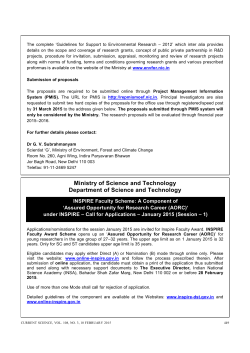
Advancing Human Rights through Higher Education
CALL FOR PROPOSALS ADVANCING HUMAN RIGHTS THROUGH HIGHER EDUCATION INTERNATIONAL HIGHER EDUCATION SUPPORT PROGRAM The Higher Education Support Program (HESP) of the Open Society Foundations invites proposals for projects that enhance the role of university communities in the advancement of human rights. Proposed projects shall address pressing, locally-relevant human rights issues and offer creative responses to these issues, fostering supportive and engaged universities which serve their communities and shape public discourses and values towards the advancement of human rights. Projects shall approach human rights from more than a theoretical perspective and forge collaborations between university communities and civil society toward tackling pressing human rights issues. HESP will consider support for projects that include, but are not limited to, at least two of the following areas of activities: 1. Action Research Knowledge production on pressing human rights issues, which includes all of the following attributes: a) Currency and local relevance; b) Aspiration to spearhead and contribute to change/reform of perceptions, policies or practices through innovative and creative solutions; c) Close collaboration between academics and community actors; d) Analysis of competing perspectives on the addressed human rights issue, learning from different contexts and, where relevant, applying interdisciplinary approaches; e) Ability to build on local intellectual and cultural resources, strengthening the role and capacity of local scholars and activists in the discourse. 2. Teaching & Public Education From developing and introducing human rights-sensitive curricula across the programs of study to offering trainings for practitioners, community actors and marginalized and CALL FOR PROPOSALS excluded groups, these project activities will advance the following objectives: a) Introducing new and/or revising existing university curricula (including content and methods of delivery) based on the best practices in the field internationally; b) Integrating contributions from various academic disciplines relevant to the subject of learning; c) Bringing knowledge and perspectives from the community into the classroom and student learning; d) Raising consciousness and equipping students with a sense of responsibility towards their immediate and extended environment; e) Promoting experiential learning and understanding of practical dimensions of human rights issues by creating opportunities for students and scholars to connect and engage directly with persons facing human rights violations; f) Creating a participatory classroom environment through fostering debate, inclusive and collaborative learning, and introducing innovative and creative teaching strategies. 3. Community Impact This area of activities aims at dissemination and integration of relevant knowledge into activism in the human rights movement through a variety of community outreach activities. At the same time (and with no less significance), these activities will seek to transform higher education institutions into supportive and inclusive environments, imbued with the sense of social responsibility and service to the community. Examples of such activities include, but are not limited to: a) Supporting universities as venues for engagement with the public through public debates, trainings, and joint university-community events; b) Raising consciousness and commitment among the fellow members of the university community, including faculty, students, administration and support staff; c) Promoting diversity on campus – advocating for access and inclusion of marginalized and excluded populations; d) Strengthening universities’ collaboration on human rights issues with other actors, including governments and international organizations. Please note: To be considered for HESP’s support the projects shall be conceptualized and developed jointly and in an equal partnership by groups of academics and community actors, or by networks of academics actively engaged with the relevant causes and active in the community outside their academic appointments. Project leaders shall ensure that the voices of excluded and marginalized populations on the addressed human rights issue(s) are integral at all stages of project development and implementation. Applicants are also encouraged to seek relevant international partnerships and introduce diverse geographic contexts and comparisons into the conceptualization of projects. HESP strongly supports active engagement of students in all project activities. Eligibility HESP will consider proposals from academic-community partnerships from any academic field and addressing any relevant human rights issue. The projects will be supported in the countries of HESP’s current on-going activities which include: Argentina, Belarus, Botswana, Burma (Myanmar), Colombia, Ethiopia, Ghana, Kenya, Kyrgyzstan, Malawi, 2 CALL FOR PROPOSALS Mexico, Mozambique, Namibia, Nepal, Nigeria, the Occupied Palestinian Territories, Peru, Russia, Senegal, South Africa, South Sudan, Sudan, Tanzania, Tunisia, Uganda, Zambia, Zimbabwe.* Involvement of international partners and contributors playing non-leading and advisory roles in projects is not limited to the geographies above. Application and Funding Interested individuals and groups are encouraged to contact HESP with brief introductions of project ideas for further consultation prior to submitting the final application. Project proposals should be submitted in English using the attached Application Form and not exceed 4 pages in length (not including supporting documents). Review of applications is conducted twice yearly. Application deadline for the next review cycle is April 30, 2015. Submissions should be made electronically to hesp.applications@opensocietyfoundations.org. Shortlisted applicants will be invited to develop project proposals and budgets in further detail in consultation with the HESP staff. HESP will consider funding requests of up to a maximum amount of 25,000 USD reflecting the scope of proposed projects. The maximum duration of a project is 12 months. It is desirable that the projects are hosted at the universities or their relevant units so as to further strengthen the commitment of higher education institutions to joint initiatives with civil society. Contact and Consultations Higher Education Support Program (HESP) Open Society Foundations Oktober 6 u. 12, H-1051 Budapest, Hungary Tel.: (+36) 1 882 6152; Fax: (+36) 1 882 3112 Email: hesp.applications@opensocietyfoundations.org * HESP will respond to expressions of interest from other (not listed above) countries in the Global South. Applicants from these geographies are encouraged to contact HESP for further consultation with a brief summary of the project idea. 3
© Copyright 2025









